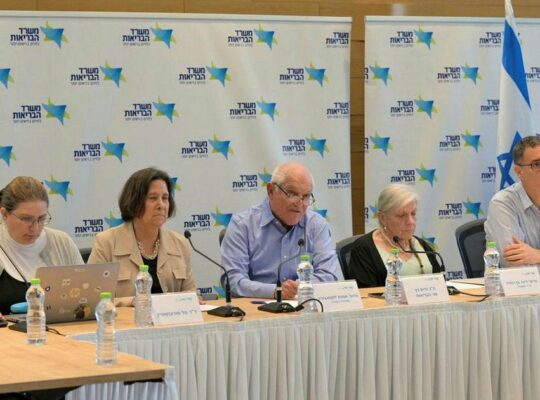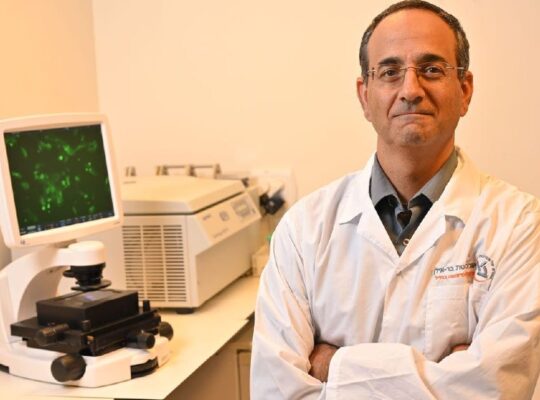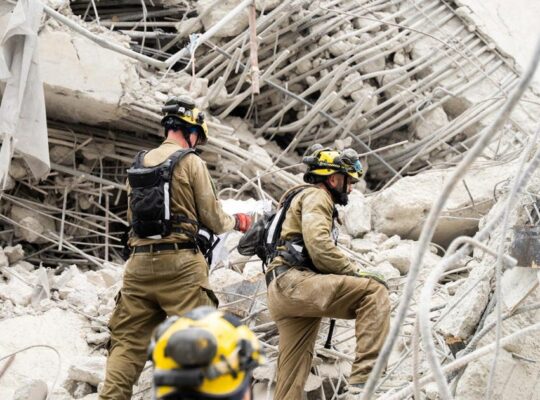The impression made by American Eagle’s Sydney Sweeney ad campaign, which was launched a month ago, has yet to fade. The ad’s controversial pun,”Sydney Sweeney has great jeans,” referring both to the jeans modeled by the American actress and to her genetics as a white, blond and blue-eyed woman, sparked a wave of reactions, parodies and online debates, including criticism claiming it promotes ideas of white supremacy and eugenics.
In Israel, a similar campaign was launched this past weekend. Israeli actress Yael Bar Zohar, also modelling a denim suit, starred in an ad campaign for the non-profit organization One in Nine, which supports women with breast cancer. Its tagline reads: “Yael Bar Zohar has good genes, and still makes sure to get checked.” Beyond the clever reference to the Sweeney ad, the message is sharp: no matter who you are, where you come from, or how you look – every woman is at risk of developing breast cancer.


Advances in the field of genetics in recent decades have enabled the healthcare system to define risk groups and pinpoint genetic and ethnic profiles that may predict disease. Extensive efforts have been made to raise awareness that Jewish women of Ashkenazi, Iraqi and North African descent are at higher risk of carrying genetic mutations that increase their risk of breast cancer, such as BRCA1, BRCA2 and others.
Surveillance protocols have also been improved for carriers and now include personalized medical counselling, dedicated follow-up centers (such as the Mirav Center at Sheba Medical Center, Tel Hashomer), seminars and more. For carriers, the recommendation is to undergo manual exams and clinical testing such as ultrasounds and MRIs every six months from age 25.
These developments are crucial, as carriers are at significantly higher risk than the general population. However, this doesn’t change the fact that every woman – regardless of genetics or ethnicity – has a 12.5 percent chance of developing breast cancer during her lifetime, according to the Israel Cancer Association. “Breast cancer is the most common cancer among women, in Israel and worldwide. About 5,000 women in Israel are diagnosed with breast cancer a year,” states the ICA’s website. One in Nine uses American Eagle’s catchy tagline to remind us: your genes do not determine your fate, we are all in this together.
The reminder that all women are at risk of breast cancer, just by being women, is uncomfortable but also vital. As the daughter and granddaughter of women who both died from the disease at tragically young ages, despite not carrying a BRCA mutation, I grew up with the knowledge that I must proactively manage my medical testing to be properly monitored for breast cancer (The Mirav Center, for instance, rejected my request to join its surveillance program because I’m a BRCA carrier, despite my strong family history).
One in Nine is now publishing new recommendations stating that manual breast exams performed by a physician are not effective for early detection and has launched a survey in collaboration with Assuta Medical Center that can help assess personal breast cancer risk. The survey is based on an Israeli study published in July that formulated a short-term prediction model for breast cancer risk. The background, the study states, is that “despite progress in breast cancer screening, many women are diagnosed with advanced stage.”
The medical guidelines for the general public recommend annual manual exams from age 40 and mammograms every two years from age 50 – a stage now understood to be too late, in some cases. The new survey, meant for healthy women ages 25 and up, will help determine when to begin clinical testing, intervals between check-ups and other preventive measures. According to the recommendations, women should bring their results to their physician, surgeon or family doctor to help them personalize and plan testing – rather than wait until age 50 for their first clinical examination.
October is the global “Breast Cancer Awareness Month,” but thanks to the new survey, women can take matters into their own hands right now. This marks an important step toward recognizing that we must adopt a proactive stance on breast cancer and internalize that even if we have “good genes” – even Bar Zohar, even Sweeney, and yes, you and me – we still need to get checked.












